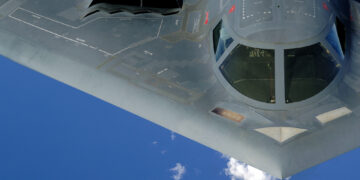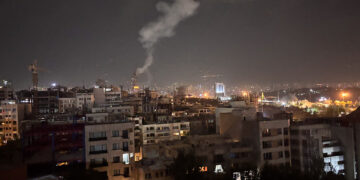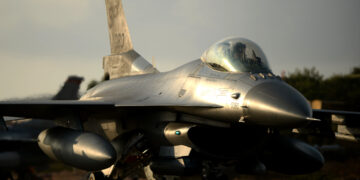October 1, 2024
With Israel, the U.S. is caught in a world of contradictions

Ever since a 2,000-pound bomb demolished Hezbollah’s headquarters in Southern Beirut last Friday and killed Hassan Nasrallah, the leader of the organization since 1992, there was an expectation among the commentariat that Iran would retaliate. The scope of that response, however, was very much in dispute. The Iranian government was reportedly divided about whether to respond at all, with the newly-elected president, Masoud Pezeshkian, taking the position that an attack against Israel would likely ruin his foreign policy agenda—he offered the West the thinnest of olive branches during his time in New York for the UN General Assembly meetings—and give the Israeli government an excuse to strike inside Iranian borders.
Supreme Leader Ayatollah Ali Khamenei, however, seems to have concluded that sitting on his hands and letting Israel’s ferocious assault on Hezbollah continue without lifting a finger wasn’t an option. This isn’t exactly surprising—Hezbollah is Iran’s crown jewel in a network of anti-Israel militias designed to keep the pressure on Israel and bolster Iranian deterrence in the Middle East. Tehran has relied on Hezbollah to bail out Syrian president Bashar al-Assad from defeat during Syria’s civil war, train allied militias like the Houthis as it fought off a Saudi-backed air campaign in Yemen and support Hamas by sustaining near-daily rocket launches into northern Israel. The string of assassinations within Hezbollah’s command structure over the last two weeks hasn’t eliminated Iran’s favorite non-state partner in the region but has certainly degraded it.
Sure enough, Iran’s response occurred days after Nasrallah was killed (a senior Iranian commander was also killed in the bombing). According to US National Security adviser Jake Sullivan, nearly 200 Iranian ballistic missiles rained down on Israel in the dead of night. Israel’s air defense system put up a hell of a fight but couldn’t shoot down every single projectile. Amateur videos showed some of the missiles hitting Israeli soil. Tel Aviv and Jerusalem were both targeted in the salvo. Miraculously, at the time of writing, the Israel Defense Forces (IDF) haven’t registered a single casualty, demonstrating the country’s exceptional preparatory measures. When the attack was over, Iran’s mission at the United Nations warned Israel to stand down and that if it didn’t, a “crushing response will ensue.”
If Tehran is hoping this threat will deter Israel from retaliation, it will likely be disappointed. After the Iranians sent drones and missiles into Israel last April, Israel used military force about two weeks later to hit back. That strike, against several targets in a single Iranian air base near the city of Isfahan, was extremely limited and no doubt designed to end the tit-for-tat before it got out of control. The Israeli airstrike inside Iran was so insignificant in Tehran’s eyes that it was barely worth addressing. The drama fortunately had an anti-climactic ending.
More on Middle East

By Jennifer Kavanagh and Dan Caldwell
June 28, 2025

By Rosemary Kelanic and Jennifer Kavanagh
June 25, 2025

Featuring Rosemary Kelanic
June 25, 2025
Events on Israel-Hamas






